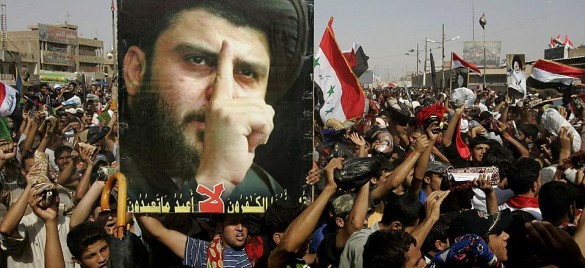
As if to mock America’s role in the future of Iraq, the single point of continuity since the fall of Saddam has been the rising power of Moqtada al Sadr. Even after his movement seemed to have been bludgeoned into submission and he took refuge in Iran, this period of dormancy during which the rough-mannered Shiite leader has focused on elevating his spiritual authority also appears to have served to help him consolidate his political power.
The Guardian reports:
The first in what could be the most crucial series of discussions to form Iraq’s new government took place early last week outside the country’s borders in the Iranian Shia shrine city of Qom.
Sitting cross-legged on the floor was a familiar firebrand in a black turban, Moqtada al-Sadr. Across from him was a delegation from the office of Iraq’s prime minister, Nouri al-Maliki. They had come to seek a detente – and more importantly to find a way, any way, that the exiled cleric, who maintains an overlord’s hold over more than two million Shia Iraqis, would support Maliki being returned to office.
It was a triumphant moment for Sadr, who had been hounded out of town in 2007 by Maliki and the US army and marginalised as a spent force by American officials and most of the prime minister’s inner sanctum. Now, here he was being courted by his persecutors. In the two weeks since the 7 March general election, with the ballots steadily falling Ayad Allawi’s way and power slipping from the grasp of the supremelyconfident incumbent leader, Sadr had been transformed from a pariah into a potential kingmaker.
Juan Cole adds:
Al-Hayat reports in Arabic on the emergence of the Sadr Movement as the largest Shiite party within the Shiite fundamentalist coalition, the Iraqi National Alliance. The Free Independent (al-Ahrar) party that represented the Sadrists won 38 seats out of the 70 that the INA garnered, making the Islamic Supreme Council of Iraq, the Islamic Virtue Party and other Shiite religious components of the list much smaller and less weighty in the coalition’s deliberations.
No sooner, the article says, than the election tallies began coming in did the government of Prime Minister Nuri al-Maliki begin gradually releasing Sadrist prisoners who had been in Iraqi penitentiaries for years. Al-Hayat’s sources say that in Babil Province, orders were received from the government to release members of the Sadr Movement, in an attempt to mollify that group.
Sadrist leader Liqa’ Al-Yasin said that the Sadrists have now become the spinal column of the Iraqi National Alliance. He said that the movement had demonstrated that it had a large public base, and asserted that that base is cultured, aware, and abiding by the principles both of Islamic Law and the Nation. Al-Yasin said that the Sadrists would work for the liberation of Iraq and the realization of national sovereignty. [Translation: they want US troops out of their country tout de suite.] He adds that other goals are to gain the release of prisoners and to take some of the burdens off the shoulders of ordinary citizens. Sadrist leaders said that “the next phase will concentrate on political action to end the Occupation altogether.


Sadr proved to be a better man than self-centered neocons urging Bsh to kill him and support Chalabi. In the end it is still Arab nationalism beating secterianism. I predict Allowi and Sadr will make the future WITH US FORCES LEAVING WITHOUT EVEN A CANTEEN FULL OF OIL!
What if it were your son/daughter that died in our Iraq lie, wouldn’t you want someone held accountable….not to speak of all the Arabs we killed as part of neocons’ WORLD WAR IV against Islam. Chirac was right afterall. Do Rumsfeld and Cheney get a civilian judge or a military tribunal?